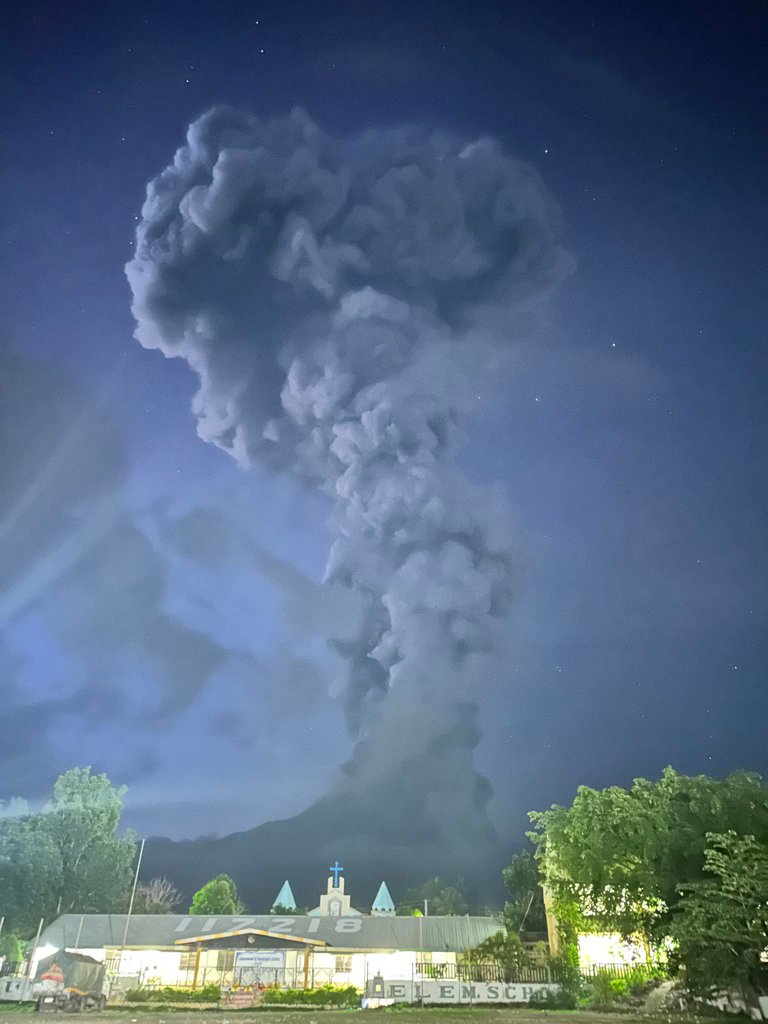
Source: https://www.gmanetwork.com/regionaltv/news/102265/kanlaon-volcano-spews-5000meter-plume/story/
The recent eruption of Mount Kanlaon made me look back and the retrospection led me to one of the undeniable phenomena I observed in times of calamities: the Bayanihan Spirit. Bayanihan spirit has been culturally embedded among Filipinos throughout history.

Source: https://steemit.com/hive-131369/@larapambuan/filipino-tradition-101-bayanihan-a-spirit-of-cooperation-and-camaraderie
Bayanihan also known as tulongan or damayan, is common among Filipinos. In the Philippines, this is a system of mutual assistance and care that serves as a foundation for family and community. In times of adversity, natural calamities, and acts of God, bayanihan becomes a distinct Filipino culture.

Source: https://www.customink.com/fundraising/supertyphoonhelpinghand
Bayanihan stands as a significant pedagogy within Filipino communities, both before and after colonial influences. It encompasses the essence of Filipino lifestyle, consciousness, decision-making, and character. Widely recognized as a positive collective relationship, Filipinos perceive Bayanihan as a voluntary commitment wherein community members actively contribute to assist each other in addressing individual and communal needs.
Bayanihan, a Filipino tradition, involves people going out of their way to assist those in need. Derived from the root word "bayan," meaning nation, it embodies a spirit of solidarity and service. Bayanihan is characterized by selfless acts, carried out without the expectation of any rewards or recognition.

(Students from a Public Senior High School repacking relief goods for the displaced people in Kanlaon Volcano areas)

Images source: https://www.facebook.com/SNHSseniorplusredcrossyouth
Bayanihan serves as the foundation of both family and community life. Its remarkable manifestation becomes most apparent during challenging times, as Filipinos come together in the face of adversity, natural disasters, and unforeseen challenges. This collective strength and unity represent the essence of the Filipino identity.

Source: https://www.facebook.com/share/CswX5ypUS4EMEZez/
As Filipino society evolves in response to globalization, urbanization, and technological advancements, the practice of Bayanihan faces contemporary challenges and opportunities for adaptation. Urbanization has led to the breakdown of traditional kinship networks and barangay-based communities, weakening the bonds of social cohesion and reciprocity. As Filipinos migrate to urban centers in search of employment and economic opportunities, they face challenges in maintaining the close-knit relationships and collective solidarity characteristic of rural Bayanihan. Despite the challenges posed by urbanization, Filipino communities in urban areas have adapted Bayanihan principles to address contemporary urban challenges. Urban Bayanihan initiatives, such as community pantries, mutual aid networks, and volunteer groups, provide vital support systems for marginalized populations and promote social inclusion and solidarity in urban settings.

(Student Government of CSA-B organizing a donation drive)

Images source: https://www.facebook.com/CSABStudentGovernment

(Balayan of USLS calling for donations for people affected of the Kanlaon eruption)
Source: https://www.facebook.com/USLSBalayan

(SSG of TUP-V, a state university calling for donation)

Images source: https://www.facebook.com/TUPVisayasUSG
The proliferation of digital technology and social media platforms has facilitated new forms of Bayanihan in the virtual realm. Online communities, social networking groups digital platforms serve as virtual spaces for sharing stories, exchanging information, and organizing collective initiatives in support of shared causes and interests.
Bayanihan knows no boundaries; we can always support our kababayans in need.